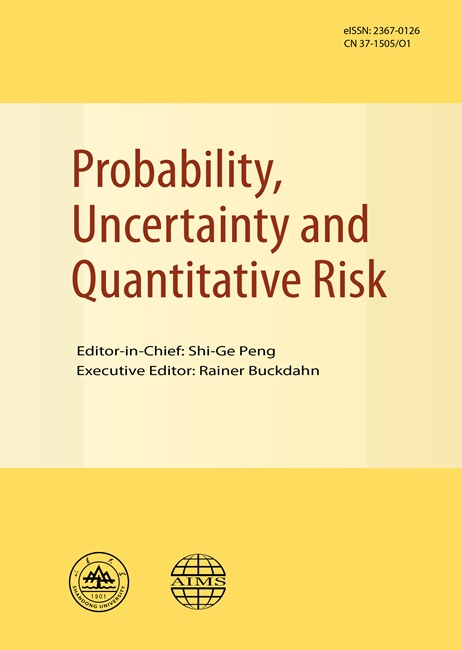在次线性期望下的大数定律
IF 0.8
2区 数学
Q3 STATISTICS & PROBABILITY
引用次数: 0
摘要
我们考虑在次线性期望$ \mathbb{E} = \sup_{P\in\Theta}E_P $下的独立和同分布(i.i.d)随机变量序列$ \{\xi_k\} $。我们首先给出了一个新的证明,即在每个$ P\in\Theta $下,经验平均值$ \bar{\xi}_n = (\xi_1+\cdots+\xi_n)/n $的任何聚类点都位于$ [\underline{\mu}, \overline{\mu}] $与$ \underline{\mu} = -\mathbb{E}[-\xi_1], \overline{\mu} = \mathbb{E}[\xi_1] $之间。接下来,我们考虑波兰空间$ \Omega $上的次线性期望,并证明对于每个常数$ \mu\in [\underline{\mu},\overline{\mu}] $,存在一个概率$ P_{\mu}\in\Theta $,使得$ \lim\limits_{n\rightarrow \infty}\bar{\xi}_n = \mu, \; P_{\mu}\text{-a.s.}, $(0.1)假设$ \Theta $弱紧且$ \{\xi_n\}\in L^1_{\mathbb{E}}(\Omega) $。在相同的条件下,我们得到了(0.1)在积空间$ \Omega = \mathbb{R}^{\mathbb{N}} $中的概化,将$ \mu\in [\underline{\mu},\overline{\mu}] $替换为$ \Pi = \pi(\xi_1, \cdots,\xi_d)\in [\underline{\mu},\overline{\mu}] $。这里$ \pi $是$ \mathbb{R}^d $, $ d\in\mathbb{N} $上的Borel可测量函数。最后,我们描述了尾的平凡性$ \sigma $ -在次线性期望下i.i.d随机变量的代数。本文章由计算机程序翻译,如有差异,请以英文原文为准。
A strong law of large numbers under sublinear expectations
We consider a sequence of independent and identically distributed (i.i.d.) random variables $ \{\xi_k\} $under a sublinear expectation $ \mathbb{E} = \sup_{P\in\Theta}E_P $. We first give a new proof to the fact that, under each $ P\in\Theta $, any cluster point of the empirical averages $ \bar{\xi}_n = (\xi_1+\cdots+\xi_n)/n $ lies in $ [\underline{\mu}, \overline{\mu}] $ with $ \underline{\mu} = -\mathbb{E}[-\xi_1], \overline{\mu} = \mathbb{E}[\xi_1] $. Next, we consider sublinear expectations on a Polish space $ \Omega $, and show that for each constant $ \mu\in [\underline{\mu},\overline{\mu}] $, there exists a probability $ P_{\mu}\in\Theta $ such that$ \lim\limits_{n\rightarrow \infty}\bar{\xi}_n = \mu, \; P_{\mu}\text{-a.s.}, $(0.1) supposing that $ \Theta $ is weakly compact and $ \{\xi_n\}\in L^1_{\mathbb{E}}(\Omega) $. Under the same conditions, we obtain a generalization of (0.1) in the product space $ \Omega = \mathbb{R}^{\mathbb{N}} $ with $ \mu\in [\underline{\mu},\overline{\mu}] $ replaced by $ \Pi = \pi(\xi_1, \cdots,\xi_d)\in [\underline{\mu},\overline{\mu}] $. Here $ \pi $ is a Borel measurable function on $ \mathbb{R}^d $, $ d\in\mathbb{N} $. Finally, we characterize the triviality of the tail $ \sigma $ -algebra of the i.i.d. random variables under a sublinear expectation.
求助全文
通过发布文献求助,成功后即可免费获取论文全文。
去求助
来源期刊

Probability Uncertainty and Quantitative Risk
STATISTICS & PROBABILITY-
CiteScore
1.60
自引率
13.30%
发文量
29
审稿时长
12 weeks
期刊介绍:
Probability, Uncertainty and Quantitative Risk (PUQR) is a quarterly academic journal under the supervision of the Ministry of Education of the People's Republic of China and hosted by Shandong University, which is open to the public at home and abroad (ISSN 2095-9672; CN 37-1505/O1).
Probability, Uncertainty and Quantitative Risk (PUQR) mainly reports on the major developments in modern probability theory, covering stochastic analysis and statistics, stochastic processes, dynamical analysis and control theory, and their applications in the fields of finance, economics, biology, and computer science. The journal is currently indexed in ESCI, Scopus, Mathematical Reviews, zbMATH Open and other databases.
 求助内容:
求助内容: 应助结果提醒方式:
应助结果提醒方式:


